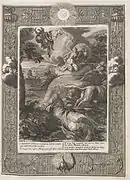Eteocles of Orchomenus
In Greek mythology, Eteocles (/ɪˈtiːəkliːz/; Ancient Greek: Ἐτεοκλῆς means "true glory"[1]) was a king of Orchomenus. The local tradition concerning him is preserved in Pausanias' Description of Greece, and runs as follows.
Family
Eteocles was the son of Andreus (himself son of the river-god Peneus) and Euippe, daughter of Leucon, and successor to his father's throne. Alternately, he was called son of the river god Cephissus (hence referred to by the patronymic Cephisiades in some poetical texts according to Pausanias). Eteocles was also called the father of Minyas.[2]
Mythology
He was credited with having founded two tribes (phylae), one of which received the name Cephisias after his possible father, and the other one was named after himself. He assigned a little of his land to Almus, son of Sisyphus, who was believed to have given his name to the village Olmonas ("Almones" was the alleged original form of its name). Eteocles was also said to have been the first to offer sacrifices to the Charites, and to have recognized three as the true number of the goddesses.[3]
The mythological connection between Eteocles and the Charites is confirmed by the account of Theocritus, who refers to the Charites as "divine daughters of Eteocles".[4] Strabo also credits Eteocles with founding the temple of the Charites, and mentions that Eteocles "was the first to display both wealth and power; for he honored these goddesses either because he was successful in receiving graces, or in giving them, or both."[5]
In another account, surviving in the commentaries of Nicolaus Sophista, a Greek philosopher and rhetor of the fifth century AD, the three daughters of Eteocles fell into a deep well while singing and dancing in honour of the Graces and drowned. Gaia, in pity, transformed them all into tall and proud cypresses. The author notes that this is why colloquially the cypresses were also called graces.[6][7][8]
Notes
- Robin Hard. The Routledge Handbook of Greek Mythology (2004)
- Scholia on Pindar, Isthmian Ode 1.79
- Pausanias, Graeciae Descriptio 9.34.9 - 9.35.1
- Theocritus, Idylls 16.104
- Strabo, Geographica 9. 2. 40
- Nicolaus Sophista, Progymnasmata 2.2
- Westermann 1843, p. 377.
- Ascherson 1884, p. 14.
References
- Ascherson, Ferdinand (1884). Berliner Studien für classische Philologie und Archaeologie. Calvary.
- Pausanias, Description of Greece with an English Translation by W.H.S. Jones, Litt.D., and H.A. Ormerod, M.A., in 4 Volumes. Cambridge, MA, Harvard University Press; London, William Heinemann Ltd. 1918. ISBN 0-674-99328-4. Online version at the Perseus Digital Library
- Pausanias, Graeciae Descriptio. 3 vols. Leipzig, Teubner. 1903. Greek text available at the Perseus Digital Library.
- Strabo, The Geography of Strabo. Edition by H.L. Jones. Cambridge, Mass.: Harvard University Press; London: William Heinemann, Ltd. 1924. Online version at the Perseus Digital Library.
- Strabo, Geographica edited by A. Meineke. Leipzig: Teubner. 1877. Greek text available at the Perseus Digital Library.
- Theocritus, Idylls from The Greek Bucolic Poets translated by Edmonds, J M. Loeb Classical Library Volume 28. Cambridge, MA. Harvard Univserity Press. 1912. Online version at theoi.com
- Theocritus, Idylls edited by R. J. Cholmeley, M.A. London. George Bell & Sons. 1901. Greek text available at the Perseus Digital Library.
- Westermann, Anton (1843). Μυθογραφοι. Scriptores poeticæ historiæ Græci. Edidit A. W. Gr.
.jpg.webp)
.jpg.webp)
